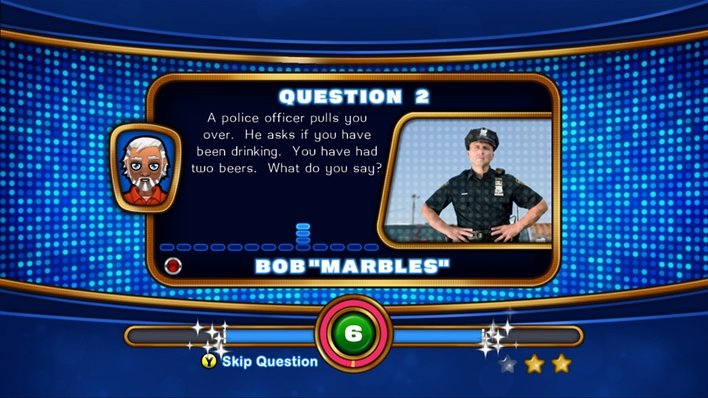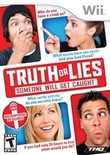As a quick warning to any couples who're thinking about picking up Truth or Lies, as a fun little party game, it's a good idea to not take the game too seriously. As we found out, to our surprise, Truth or Lies is a game that doesn't pull any punches with its questions - especially when you play as a couple. Beginning by asking me what nickname I have for my girlfriend's private parts (incidentally, the answer is, nothing), the game got off to a strange start, as I started to plead my innocence to the game, and explain that nicknaming genitals is not always a standard part of the bonding process. After telling me I'm lying, and seemingly being dissatisfied with my answer, the game suddenly decided to kick things up a gear, and moved from the "hilarious party embarrassment questions", to the "answer this wrong and your relationship is over", variety.
"Have you ever had bad sex?" was one of the next questions it gave us (we can't remember the exact words, but it was definitely along those lines), followed by, later in the same game, "When was the last time your partner pissed you off?". But as the line of questioning became increasingly more uncomfortable (and luckily, we both managed to fend off or dodge the worst questions), the game decided to throw us a curve ball, and asked the question that could lead to many a loving relationship turning into sleeping on the sofa affairs - "If your partner asked if they should go on a diet, what would you say?". It's almost like the game had decided it didn't like us being a couple - perhaps it was jealous - and had decided to cause trouble between us. Almost like the game had a mind of its own....

I presume it'd start with "Hello"
Truth or Lies is a game based on a very simple concept. By using a microphone (which isn't included - you'll have to buy your own USB Wii compatible microphone, or use one from We Sing/Rock Band/Guitar Hero), and answering the questions the game asks, the game will attempt to decide whether you're telling the truth, or lying. The more honest you are, the more points you'll get - but, of course, the less you lie, the more likely you are to have to admit your secrets in front of your friends. It's been designed as party game fodder, and with a group of friends who're willing to have a laugh at their own expense, it works fine - as at a party, you won't have to worry about its flaws.
Of course, the main flaw is a pretty big one, as the main selling point of the game doesn't work. Going into it, we were suspicious as to how accurate it's Truth or Lie detector would be, and our suspicions were quickly confirmed, when the game flagged up several truths (mostly Sarah's) as lies. When you first start the game, you'll be invited to complete a profile, and calibrate the game to your voice, by answering a series of three questions truthfully, followed by three blatant lies. And while this is an understandable step, it does mean party games take that much longer to get into, as you have to sit around and wait for each player to calibrate their game.

The questions are hardly life or death scenarios.
When you've done that, you'll progress into the game proper, where you'll first have to choose the makeup of the people you're playing with - whether you're adults, children, a family, or couples. Of course, you should be very careful picking the couples, or possibly the adults categories, if you're with people you may be uncomfortable discussing your sex life in front of, but it's good that the game actually gives you the choice of filtering out the more questionable, er, questions that it could give you.
After choosing your category, you'll be met with three rounds of questions, which seem to have little in the way of themes or progression. After the voice over man reads out the question, you'll have to start giving your answer - there's no time for thinking here. The problem is, you're not really allowed to give one or two word answers - instead, you'll simply have to keep talking until the game's got enough information from you to work out whether you're lying or not. If it gave you some idea of how long you'd have to speak for, it'd be better, but instead, you're left having answered the question, with the little bar that shows how much information the game's got from you being only a quarter full. All that leaves is for you to try and add to what you've said, or simply go "la la la" into the microphone, as you can't think of anything to add, which often makes the game think you're lying. Even stranger is that the game often asks you questions which only require one or two word answers - answers which won't give the game enough information to judge if you're lying.

And that's not a leading question in the slightest, with a big picture of a gooey chocolate cake next to it, is it.
Thankfully, in the child and family categories, the questions change from the intrusive to the more puerile, and innocently funny. It's great that there's an option to filter out the more extreme questions by picking a different category, but we can't stress enough how important it is to ensure you're in the right company if you pick the couples category - unless you want to risk discussing your sex life in front of your parents.
And in fact, the same is true for most of Truth or Lies. Yes, it doesn't really work as a lie detector, but in this case, that doesn't really make it that much less fun - telling you you're lying about something that you're obviously telling the truth about is presumably intended to create plenty of "gasp" moments, and in the right environment, with the right friends, it's definitely capable of creating a laugh. As something you whip out every once in a while when you've got a group of friends around, it does its job - although setting it up is a lot more awkward than it should be, considering how inaccurate it is anyway.
Format Reviewed: Nintendo Wii




















